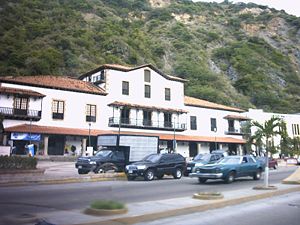- Compañía Guipuzcoana de Caracas
-
 The old buildings of the Real Compañía Guipuzcoana de Caracas in La Guaira
The old buildings of the Real Compañía Guipuzcoana de Caracas in La Guaira
The Real Compañía Guipuzcoana de Caracas (the Royal Gipuzkoan Company of Caracas) was a Spanish trading company in the 18th century, operating from 1728 to 1785, which had a monopoly on Venezuelan trade. It was renamed in 1785 the Real Compañía de Filipinas.
Contents
History
The Company was founded by a group of wealthy Basques from the province of Gipuzkoa in 1728, under the leadership of the Count of Peñaflorida, Xavier María de Munibe e Idiáquez. The specific aim of the Company was to break the de facto Dutch monopoly on the cocoa trade in the Captaincy General of Venezuela. It was initially based in San Sebastián and received its royal decree on September 25, 1728, by Philip V of Spain.[1] Its creation was part of the larger Bourbon Reforms to control unlicensed trading, especially in tobacco, which existed along the Orinoco River and mostly benefited the foreign, Dutch traders.
Operations and effects in Venezuela
 Castle San Felipe at Puerto Cabello, constructed by the Company from 1732 to 1741
Castle San Felipe at Puerto Cabello, constructed by the Company from 1732 to 1741
The Guipuzcoana Company was the only body entitled to sell European goods in Venezuela (or Caracas) Province and to export Venezuelan agricultural products to Spain. It began operating in 1730 and quickly prospered because the Basque ports were not part of the regular Spanish customs zone and were able to trade freely throughout Europe.[1] The company was instrumental in the development of large-scale cocoa production along the valleys of the coast. This new area of economic activity not only brought great profits to the company, but also benefitted Criollos with large landholdings, who developed plantations on their properties. In fact, the term un gran cacao became a nickname for a member of this new powerful class (and to this day the term is used jocularly in Venezuela for a VIP). However, it did not help smaller farmers who continued to participate in illegal trading. In addition the company promoted the exploration and settlement of frontier areas, most famously under the border expedition of 1750-1761 headed by a company agent, José de Iturriaga y Aguirre, which resulted in new settlements in the Guayana region.
The Company's control of the major ports of La Guaira and Puerto Cabello meant that it effectively monopolized the legal trade of the other Venezuelan provinces. In addition, the Company's strict control of much needed manufactured imports naturally created a lot of resentment in a region which depended on these. Following several rebellions against the Company, the largest of which occurred in 1749 under Juan Francisco de León, the Spanish crown finally ended the Company's monopoly in 1785. The crown no longer saw the need for a monopolizing company to control and grow the economy, since by that time the Venezuelan economy had matured and been tightly linked with the markets of Spain and New Spain, which consumed most of its cocoa. Instead a consulado de mercaderes (a merchants' guild) was established in Caracas in 1793. The owners of the Guipuzcoana Company transformed it into the Real Compañía de Filipinas
Effects in Gipuzkoa
Apart from breaking the Dutch monopoly and creating significant wealth in the Basque port cities, another outcome was the foundation in Bergara of the first Sociedad Económica de los Amigos del País—a type of Enlightenment think tank—by Peñaflorida in 1766.
References
- “Juan Francisco de León” in Diccionario multimedia de Historia de Venezuela. Caracas: Fundación Polar, 1995.
- Amezaga y Aresti, Vicente. Hombres de la Compañía Guipuzcoana. Caracas, 1963.
- Arcila Farias, Eduardo. Economia colonial de Venezuela. 1946.
- Baglio, Assunta. 1996. La Guaira, puerto comercial de la Colonia. Infometro, XVIII, (150), 1996. 17-19.
- Basterra, Ramón de. Una empresa del siglo XVIII. Los Navíos de la Ilustración. Madrid: Cultura Hispánica, 1970 [1925].
- Efemérides venezolanas. "La Comapñia Guipuzcoana". http://www.efemeridesvenezolanas.com/html/compania.htm. Retrieved February 10, 2007. (Spanish)
- MiPunto.com. "Comapañia Guipuzcoana". http://www.mipunto.com/venezuelavirtual/temas/3er_trimestre02/guipuzcoana.html. Retrieved February 10, 2007. (Spanish)
- Ramos Pérez, Demetrio. El Tratado de límites de 1750 y la expedición de Iturriaga al Orinoco. Madrid: Consejo Superior de Investigaciones Científicas; Instituto Juan Sebastián Elcano de Geografía, 1946.
See also
Categories:- Companies of Venezuela
- Companies established in the 18th century
- Companies established in 1728
- Spanish colonization of the Americas
- History of Venezuela
- Basque
- Basque diaspora
- Defunct companies of Venezuela
Wikimedia Foundation. 2010.
